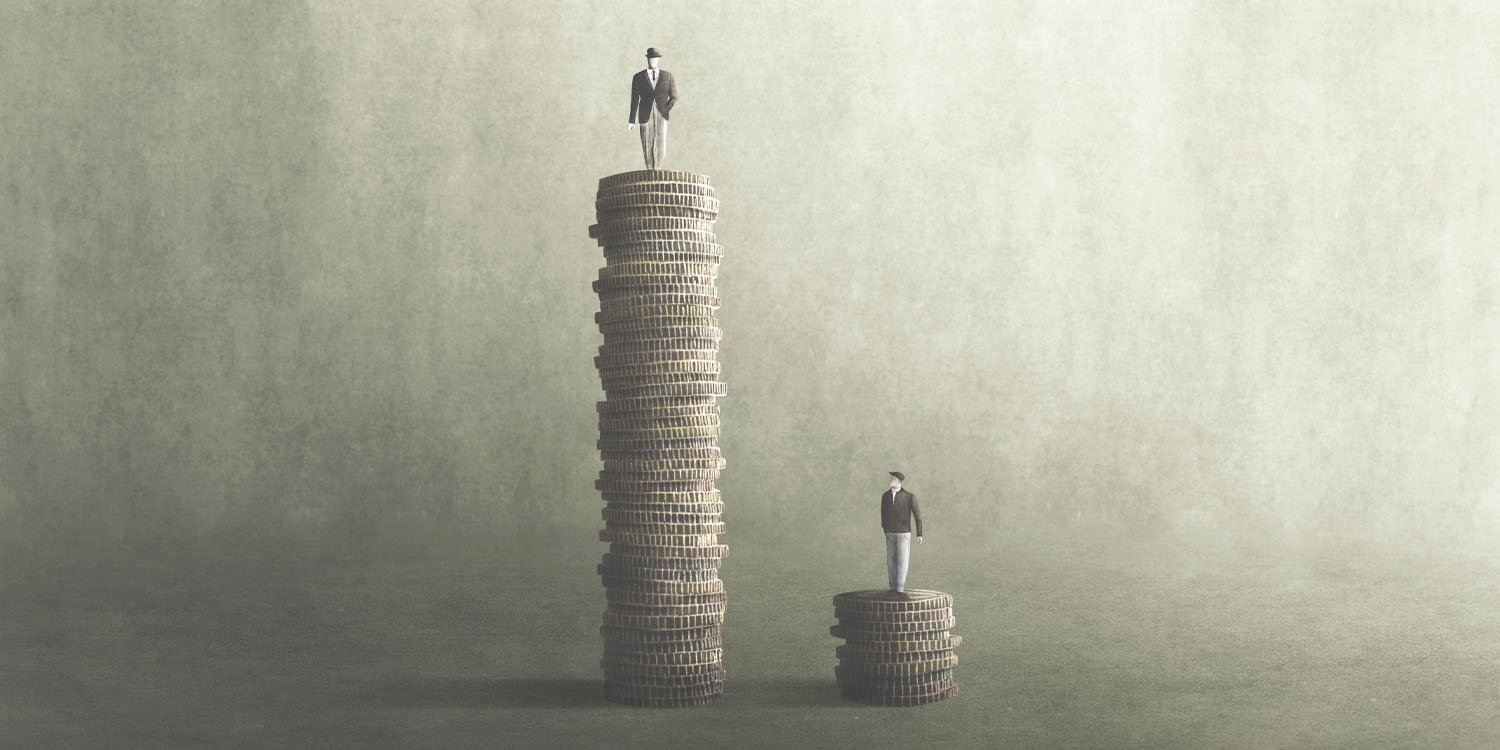New research published in PNAS Nexus reveals a link between economic inequality and the tendency to view the world through a moral lens. The study, which analyzed Twitter data and surveyed people across 41 regions worldwide, suggests that as economic inequality grows, so does the emphasis on morality in daily life. This phenomenon may be a way for individuals to restore a sense of order and control in a society they perceive as increasingly chaotic.
Economic inequality has been a growing concern worldwide, with many studies showing its adverse effects on social cohesion, trust, and cooperation. However, less is known about how inequality affects the way people think about and judge moral issues. The researchers hypothesized that when people perceive the social fabric of society as fraying—something that often accompanies rising inequality—they might respond by becoming more morally vigilant. In other words, they may increasingly view issues through a moral lens as a way to impose order on what feels like a disordered world.
“Back in 2016, just before starting my PhD, I was feeling pretty lost. I knew I had a deep love for psychology research, but I wasn’t sure what I could be passionate enough about to dedicate four years of my life to. So, I did a bit of soul searching on a trip to the United States, spending two weeks in New York City — a place I’ve always loved,” said study author Kelly Kirkland, a research fellow at the University of Queensland and honorary fellow at the University of Melbourne.
“I’m a dual Australian/American citizen and had visited plenty of times as a kid, but this time was different. As I walked the streets on my own, I started seeing the city in a new light. I was struck by the stark contrast between the extreme wealth and the pervasive homelessness, all existing side by side.”
“The more I observed, the more I felt that this had to be affecting people’s psychology in some way. When I returned home, I dove into the limited research on how economic inequality influences how people think and behave. It was a bit of an ‘aha’ moment — I realized there was something really important here. Since then, I’ve been deeply involved in trying to understand how inequality impacts how we treat others, work together, compete, and, ultimately, how it erodes social cohesion.”
“Now, my work is part of a larger and growing body of research that’s showing how high levels of inequality might be breaking down the very cohesion we need in society,” Kirkland explained. “And that’s a big problem. Our future is going to be filled with challenges that require us to work together — whether it’s tackling climate change or addressing the threats of pandemics.”
The researchers began by analyzing a massive dataset of six billion tweets from 2012 to 2020. To identify tweets containing moral content, the researchers used a specialized dictionary of moral words. This dictionary was categorized into several moral foundations, such as harm, fairness, loyalty, authority, and purity, and included both virtue-related words (e.g., “help”) and vice-related words (e.g., “hurt”). The tweets were then geolocated to specific cities in the United States, which allowed the researchers to analyze the data at the city level.
To measure economic inequality in these cities, the researchers used the Gini index, a commonly used indicator that ranges from 0 (perfect equality) to 1 (maximum inequality). They also gathered data on several control variables, such as local economic conditions (measured by Gross Domestic Product, or GDP), levels of religiosity, and political orientation, to ensure that the effects they observed were truly related to inequality and not other factors.
The researchers applied statistical models, specifically negative binomial generalized linear mixed models, to examine the relationship between the level of economic inequality in each city and the frequency of moral language used in tweets. By controlling for the total volume of tweets and including random effects to account for variations by year and location, they were able to isolate the impact of economic inequality on moral language.
The findings revealed a clear relationship between economic inequality and the use of moral language on Twitter. Cities with higher levels of inequality were associated with a greater frequency of tweets containing moral words. This relationship held across all categories of moral language, including both virtue and vice words, and across different moral foundations.
The effect of economic inequality on moral language persisted over time. For instance, higher inequality in a given year predicted an increase in the use of moral words in tweets the following year. Even after controlling for factors like GDP, religiosity, and political orientation, the link between inequality and moral language remained significant.
“I was surprised by how robust some of our effects were, especially when analyzing the use of moral words on Twitter,” Kirkland told PsyPost. “It didn’t seem to matter how we categorized these words—whether they related to authority, harm, or fairness—high inequality was consistently linked to an increase in moral dialogue online.”
Next, the researchers expanded their investigation to a global scale, surveying participants from 41 regions across 35 countries. A total of 6,665 participants were recruited, primarily from university samples, and asked to complete a questionnaire that measured their moral judgments. The participants were presented with various scenarios, known as Clifford vignettes, which depicted actions that could be judged on moral grounds, such as harming others, violating fairness, or breaking loyalty. Participants rated how morally wrong they found each scenario on a scale from 1 (not at all wrong) to 5 (extremely wrong).
The researchers also collected data on the objective level of economic inequality in each country using the Gini index, as well as participants’ subjective perceptions of inequality in their society. Additionally, they measured participants’ perceptions of anomie—the belief that social norms and standards are breaking down—and controlled for various demographic factors, such as age, gender, religiosity, and political orientation.
The results indicated that higher economic inequality, both objective and perceived, was associated with harsher moral judgments across a wide range of scenarios. This relationship was observed at both the country level and within countries, suggesting that people in more unequal societies are generally more critical and judgmental of others’ behaviors.
Importantly, the study also found that perceptions of anomie — the belief that society’s social fabric is deteriorating — played a significant role in mediating the relationship between economic inequality and moral judgments. In other words, people who perceived higher levels of inequality were more likely to feel that social norms were breaking down, and this sense of societal disorder was linked to harsher moral judgments.
“What the average person should take away from our study is that rising economic inequality might be doing more than just widening the gap between the rich and poor — it could also be making us more judgmental and divisive,” Kirkland said. “As inequality grows, people may start feeling like the social fabric that holds us together is unraveling, leading them to take stronger moral stances in an attempt to regain control. While this might seem like a way to bring order, it can actually deepen divisions, making it harder for us to work together on the big challenges our society faces, like climate change and pandemics. Understanding this connection between inequality and moralization is crucial if we want to address the root causes of our growing societal divides.”
But the study, like all research, has some caveats.
“While these findings are compelling, it’s important to note that we don’t yet have experimental evidence to definitively prove that high inequality causes changes in moralization,” Kirkland explained. “Currently, our conclusions are based primarily on correlational data. However, we did analyze time-series data from Twitter, which showed that rising inequality seems to precede an increase in moral language online. This suggests a possible link, but confirming it through experimental research is a crucial next step.”
“We have a lot of plans for the future of this work. Our first goal is to replicate our findings. We’re currently doing that with a new dataset spanning 44 countries, where we’ll explore whether high inequality not only influences how harshly we judge others’ actions but also our desire to punish them and how we assess their overall character (e.g., whether their actions make them a “bad” person).”
“Beyond replication, we aim to extend this research to examine how other societal-level threats—such as pathogens, political upheaval, climatic disasters, and food shortages—might influence people’s moral perspectives. Specifically, we’re interested in whether greater exposure to these threats leads people to adopt more extreme and defensive moral stances, potentially fueling polarization in society.”
“One thing that often goes unnoticed in public conversation is that economic inequality isn’t just about who has more money — it’s about much more than that,” Kirkland added. “Numerous studies have shown that inequality has profound effects on the social and political fabric of society. As we witness more instances of extremism and polarization around the world, it’s crucial to recognize that inequality may be a factor simmering beneath the surface, potentially contributing to these issues.”
The study, “High economic inequality is linked to greater moralization,” was authored by Kelly Kirkland, Paul A M Van Lange, Drew Gorenz, Khandis Blake, Catherine E Amiot, Liisi Ausmees, Peter Baguma, Oumar Barry, Maja Becker, Michal Bilewicz, Watcharaporn Boonyasiriwat, Robert W Booth, Thomas Castelain, Giulio Costantini, Girts Dimdins, Agustín Espinosa, Gillian Finchilescu, Ronald Fischer, Malte Friese, Ángel Gómez, Roberto González, Nobuhiko Goto, Peter Halama, Camilo Hurtado-Parrado, Ruby D Ilustrisimo, Gabriela M Jiga-Boy, Peter Kuppens, Steve Loughnan, Khairul A Mastor, Neil McLatchie, Lindsay M Novak, Blessing N Onyekachi, Muhammad Rizwan, Mark Schaller, Eleonora Serafimovska, Eunkook M Suh, William B Swann, Jr., Eddie M W Tong, Ana Torres, Rhiannon N Turner, Christin-Melanie Vauclair, Alexander Vinogradov, Zhechen Wang, Victoria Wai Lan Yeung, and Brock Bastian.




